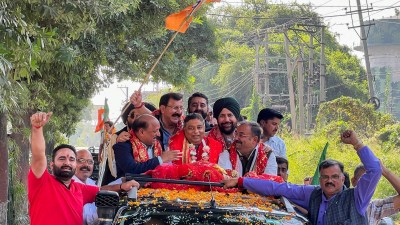House this for clarity?
The Parliament debate on the n-deal was a missed opportunity to probe important issues.

The debate in Parliament over the nuclear deal was not expected to shed new light on substantive issues relating to the 123 agreement. It was, first and foremost, about salvaging some respectability for Parliament as an institution. Second, the long drawn-out debate over the deal has the peculiar fascination of a thriller genre called “reverse suspense”. In this genre you know the identity of the perpetrator of the crime, but you don’t quite know how they will trip up and be caught. The positions of the political parties are well known, quite how they will trip each other up less so. The BJD’s defection from the ranks of the critics, the fact that the UPA allies stood steadfast, and the mildness of the Left, were a political victory of sorts for the Congress. It at least insulates it against the charge that the deal is being foisted on the nation. Whether you like the 123 agreement or not, it has to be admitted that Congress speakers, particularly Jyotiraditya Scindia, seemed better prepared.
Samajwadi Party’s MP Professor Yadav caused a brief flutter by the tenor of his remarks which left it unclear which side the SP was batting for. The SP’s solicitude for the PM’s credibility allowed for speculation to run rife. One of the glorious uncertainties of a fragmented party system is that it is not always clear who will need whom and on what occasion. Will the SP need protection against the BSP? Or did India’s powerful capitalist lobby finally get to it? The party later clarified that it opposes the deal, but as is typical of the nuclear drama, the SP leaves you with the feeling that we have not quite heard their last word on this one. As an aside, the one little discussed but unprecedented fact about the politics of this deal is that big Indian capital has, with a united front, lobbied for this deal. The fact that Indian capital has weighed in so much on a strategic issue is itself deeply interesting. How much that intervention has paid off remains to be seen, but it is an interesting question.
In the Lok Sabha at least the debate was a missed opportunity to probe some of the important issues in depth. When L.K. Advani starts taking recourse to N. Ram rather than Ram, you begin to wonder about the BJP’s ideological clarity. He answered the charge that the BJP had agreed to a testing moratorium convincingly enough. India did agree to a moratorium, but it never gave up the right to reverse it. But the issue of the right to conduct further tests has been consistently obfuscated. The way Advani framed the question didn’t help the matter. The PM is formally correct in saying that the 123 agreement does not prohibit future testing. The real issue is, as always: will you be in a position to bear the costs of whatever penalties accrue upon testing? This matter cannot be settled by the agreement itself. It depends upon the structure of your specific supply contracts, your investment in indigenous technology and a host of other things. Much of the debate made a mere gesture in this direction without forcing the issue of what we concretely plan to do to insulate India from the possible effect of sanctions should they be imposed.
A particular example of this lacuna is manifested, most ironically, in the issue that most parties agree upon: that India should continue to explore and invest in indigenous thorium-based technology. But there is almost no serious public discussion on thorium strategy. This requires at least three things. There has to be a proper reckoning of the way in which successive governments have been running down India’s science capabilities. This issue is a litmus test of how committed a government is to India’s independence. And this is an issue on which the Manmohan Singh government’s credibility is the lowest. But both the BJP and the Congress prefer a conspiracy of silence on this. The second issue has to be the structural changes that BARC and DAE badly need. This issue is tied up with a third one: the regulatory changes needed to translate our achievements in physics in this area into commercially exploitable technologies.
The issue of a sovereign and independent foreign policy was again gestured at but not debated. On this, the BJP’s credibility is the lowest, since it has reduced the question of independence and sovereignty to a single issue of the right to test. But Advani did little to allay fears that its invoking of self-respect and sovereignty was nothing but crocodile tears. After all, on most issues, its foreign policy is even more dangerously aligned with American foreign policy than the UPA’s. It would probably endorse even more damaging agreements like the logistics support agreement.
Then there is the issue of energy. The simple fact is, that it is difficult to discuss this in good faith simply because we don’t have a national energy strategy, and to claim that the 123 agreement is a necessary feature of a non-existent strategy is an exercise in disingenuousness. And, finally, Pranab Mukherjee raised the profound issue of non-discriminatory universal disarmament. But India’s concrete strategy for achieving a just, safe and equitable nuclear order remains unclear.
In short, while the Congress walked away with the political edge in the debate, there was a profound sense that it remained at the level of objectives, rather than providing an occasion for parties to hold each other’s concrete strategies to account. Admittedly, the format is not propitious for such an exercise. The debate was unlikely to change any minds on whether the 123 agreement was a good idea. While the Congress defended the 123 text ably, it could not overcome the credibility gap it has, on just how independent our foreign policy really is. The BJP could not shake off the suspicion that it will sell the store for even less. And, in the public mind, the Left has so little locus standi on foreign policy issues that it struggles even when it has a plausible case. It is still unclear whether it will simply bark or bite, whether its reputation for ideological doggedness will be replaced by a reputation for craven opportunism. The PM was lauded for his integrity. But whether any party can combine both integrity and judgment remains to be seen.
The writer is president, Centre for Policy Research






- 01
- 02
- 03
- 04
- 05

























